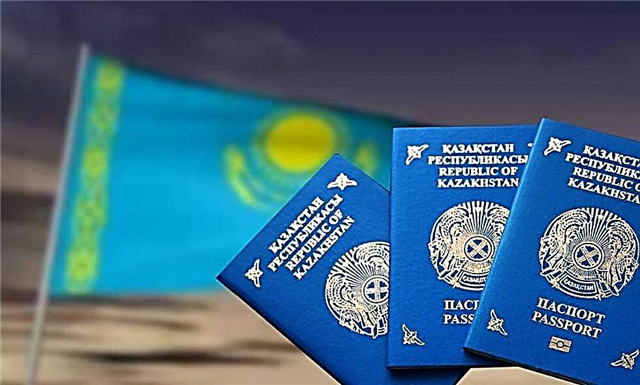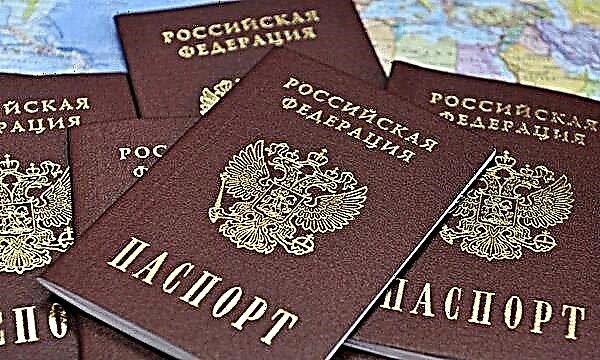For each country, the main wealth is its citizens - persons with a special connection with the state. In international practice, there are several ways to establish such a connection, one of the most non-standard is the option. Understanding the features of this procedure and the cases of its application is extremely important for residents of regions that change jurisdiction and become part of another country. In this article, we will consider what an option is and in relation to whom it can be applied.

How to get Russian citizenship
The presence of citizenship - a stable legal relationship between a person and a state - creates a certain relationship between them, which are expressed in the presence of mutual rights and obligations. The main issues related to the regulation of these relations are regulated by the Federal Law of May 31, 2002 No. 62-FZ "On Citizenship of the Russian Federation".
Article 11 of this law defines the following possible ways of obtaining a Russian passport:
- Acquisition of citizenship as a result of option.
- The right to "blood" (birth from Russian parents).
- The right to "soil" (birth on the territory of the Russian Federation).
- Naturalization (also called admission to citizenship) is the fulfillment of the conditions stipulated by the laws necessary to obtain the status of a citizen (living in the territory for a certain time, knowledge of the language and laws, having a job or a certain qualification, and so on).
- Restoration of citizenship - can be applied to persons who previously voluntarily severed their ties with the Russian state.
Each of the above grounds has its own characteristics, which are beyond the scope of our article. Particular emphasis will be placed directly on the option procedure.
Option concept
Before talking directly about the procedure, it is worth defining the phenomenon in question. The choice of citizenship when changing the borders of states is called an option.
This procedure can also be applied in cases when, due to the peculiarities of the legal systems of different states, a situation has arisen in which one person has two passports of different countries and he is obliged to make a choice in favor of one.
But most often this happens in the case of a transfer of a certain territory from the jurisdiction of one state to another country. This method is based on the voluntary choice of a person, thus, an option is the acquisition of citizenship, made on the basis of a conscious decision of a person who chose to associate himself with a specific country.
As a result of such an action, a person can choose: either he remains in the old citizenship or receives a new one, or, if such a situation is permissible by law, draws up a double one.
Distinctive features of the option are, firstly, that it is used both en masse and individually (for example, upon marriage), and secondly, the option is a way to change citizenship based on a voluntary choice from several available options ...
When option applies

The most common case of an option in world practice is the change of jurisdiction of one state to another in a certain territory. In this situation, much depends on the agreement between the countries or on the decision of an international competent body (for example, the UN decision to create the state of Israel). In such a document, provisions are usually formulated on the basis of which the determination of citizenship of people living in such a territory will take place.
The reasons for the option:
- The transfer of part of the territory from one country to another and the subsequent change of borders.
- Creation of a new state due to the separation of its part.
- In the event of the formation of a new state (as a result of the collapse of the previously existing one), the acquisition of a new citizenship can occur mechanically. Thus, the automatic change of citizenship is the establishment of a legal connection between a person and a state, in which, due to a number of political and legal reasons, a person is assigned the citizenship of a certain country and the person does not have the opportunity to associate himself with another state formation.
In the twentieth century, in the history of which two world wars and the disappearance of the so-called "socialist camp" of countries, many examples of option can be cited: for example, when Bukovina was transferred from Romania and Transcarpathia from Czechoslovakia to the USSR, people living in these territories were given the opportunity to choose in the citizenship of which country they wish to remain.
Residents' rights during the option
As already mentioned, the right to choose the citizenship of a person residing in a territory whose jurisdiction changes from one state to another is unshakable (of course, if the country continues to exist). This is a prerequisite, enshrined in the norms of international law, and its non-observance leads to the fact that the entire procedure can be recognized as illegal at the interstate level and its results will not be recognized by the international community.
In addition to the fact that a person has the right to choose citizenship that is different from what he already had, he also has the right to preserve the previous indigenous, if the state has not ceased to exist and this is consistent with the norms of national legislation.
However, it must be remembered that the choice, whatever it may be, will necessarily have legal consequences: for example, a person who does not want to change citizenship may have to change his place of residence and leave for the country whose jurisdiction over a certain territory has been lost.
In addition, the norms of international law protect the property of people: no matter what status a person finds himself in and wherever he stays to live, the right of ownership to his property, including real estate, is not lost.
Who cannot exercise the right to option
The option procedure applies only to those who live in a specific territory where jurisdiction is changing. This means that only those who are registered in this territory can apply for a new civil status by option; this provision does not apply to all others living there at that moment.
Sometimes citizenship is automatically assigned to all those who are registered in a certain territory, and a change in status can only affect representatives of certain nationalities, and so on.
In addition, in each specific case, the features can be regulated by an agreement between states.
Can the option apply to minors
 The choice of citizenship is a very important step, the consequences of which will affect the whole life, therefore, as a general rule, only adults and fully capable persons can make such a decision. Thus, all those who have not reached the age of majority are not affected and they acquire the same citizenship as their parents.
The choice of citizenship is a very important step, the consequences of which will affect the whole life, therefore, as a general rule, only adults and fully capable persons can make such a decision. Thus, all those who have not reached the age of majority are not affected and they acquire the same citizenship as their parents.
By international agreement, however, there may be an exception to this rule. As an example, the following case can be cited: in 1938, during the transition of the Sudetenland, it was envisaged that if during the period of the option the child becomes an adult, he may disagree with the choice of his parents and independently choose his citizenship.
Consequences of the procedure
The consequences of the option are very significant: a person who has gone through this procedure acquires a connection with a new state, before which he has new rights and obligations. At the same time, there are cases when the choice of a different citizenship by a person does not lead to the need to get rid of the previous one, and in this case the person becomes a bipatride - a person with dual citizenship. If, in accordance with an international agreement, or rather because of its absence, a person cannot be a bipatride, then the only solution in such a situation is to withdraw from the old citizenship.
Implementation of the option on the example of Crimea
The last massive example of such a method of obtaining citizenship is the option of Crimea. This happened in 2021 after the events of the so-called "Russian spring", as a result of which the Crimean peninsula was included in the Russian Federation. The procedure in Crimea was unusual, since no agreement was concluded between Ukraine and Russia. Its results have not yet been recognized by many countries, and Ukraine insists on the illegality of its character.
 However, according to the Treaty on the Admission of Crimea to Russia, all residents of the peninsula who did not express a desire to become Russian citizens had to submit an application before April 18, 2021. In all other issues of registration of civil status, the example of Crimea is classic: all those who received a passport of a citizen of the Russian Federation had the right to leave a Ukrainian document as well. In this regard, the Ukrainian authorities were unanimous with the Russian ones and did not cancel the Ukrainian passports of the inhabitants of the peninsula, therefore the majority of Crimeans now hold passports of both the Russian state and the Ukrainian state.
However, according to the Treaty on the Admission of Crimea to Russia, all residents of the peninsula who did not express a desire to become Russian citizens had to submit an application before April 18, 2021. In all other issues of registration of civil status, the example of Crimea is classic: all those who received a passport of a citizen of the Russian Federation had the right to leave a Ukrainian document as well. In this regard, the Ukrainian authorities were unanimous with the Russian ones and did not cancel the Ukrainian passports of the inhabitants of the peninsula, therefore the majority of Crimeans now hold passports of both the Russian state and the Ukrainian state.
What is "transfer", "reintegration" and how do they differ from option
A transfer is an automatic and uncontested change in the ownership of the population living in a territory that is included in another state and comes under its jurisdiction. Its peculiarity lies in the lack of choice. Citizenship of a person is determined exclusively by agreements between countries and most often resembles a kind of "exchange" of the population. The world practice of this method of acquiring citizenship is insignificant: one of the most famous cases is the unification of Germany in 1990, when the citizens of the German Democratic Republic received passports of the Federal Republic of Germany.
Reintegration is the restoration of citizenship after it has been lost for certain reasons. To understand how the option differs from the restoration of citizenship, it should be remembered that the option allows you to obtain the citizenship of the country for the first time, while during reintegration, the lost connection between the person and the state is officially renewed.
Other ways of acquiring citizenship
Let's say a little about other ways of obtaining citizenship, which are indicated in Art. 11 of the Federal Law "On Citizenship of the Russian Federation":
- Birth from Russian citizens. If both parents have Russian passports, then the child will be associated with Russia, regardless of the place where he is born. If one of the parents has a passport of the Russian Federation, and the other is a foreigner, then the parents, as a rule, by mutual consent, choose the child's citizenship.
- Birth on the territory of Russia. Most Russians receive Russian citizenship automatically on the basis of the fact that they were born and live on the territory of the Russian Federation. In addition, such a practice is widespread in most countries of the world, and it is actively used by migrants who often come to the Russian Federation with the aim of having a child in order to ensure that they receive a Russian passport in the future.
- Restoration of citizenship. It is applied in relation to those who already had a passport of the Russian Federation, but for some reason the connection with the state was terminated.
- Admission of a foreigner to the citizenship of the Russian Federation. Occurs after a person has met the requirements of the law to obtain it. In addition, this method can be used as a basis for acquiring citizenship when changing state borders. So, in Russia there is a simplified procedure for admitting citizenship to those who were born in the republics of the former USSR and have not changed their Soviet passport.
Details can be found in the article: “Grounds for obtaining citizenship”.
Conclusion
Option is a method of registration of communication with the state provided for by the norms of international law for those who choose another citizenship due to the change in the borders of the previous country of residence. This method has both pros and cons. Its undoubted advantages include the possibility of choosing citizenship, as well as a high probability of having two passports of different states, and its disadvantages - strong dependence on the agreement of countries on how the jurisdiction of the disputed territory will change. Currently, this is the most optimal way to determine the legal status of people who live in an area that is becoming part of another state.











